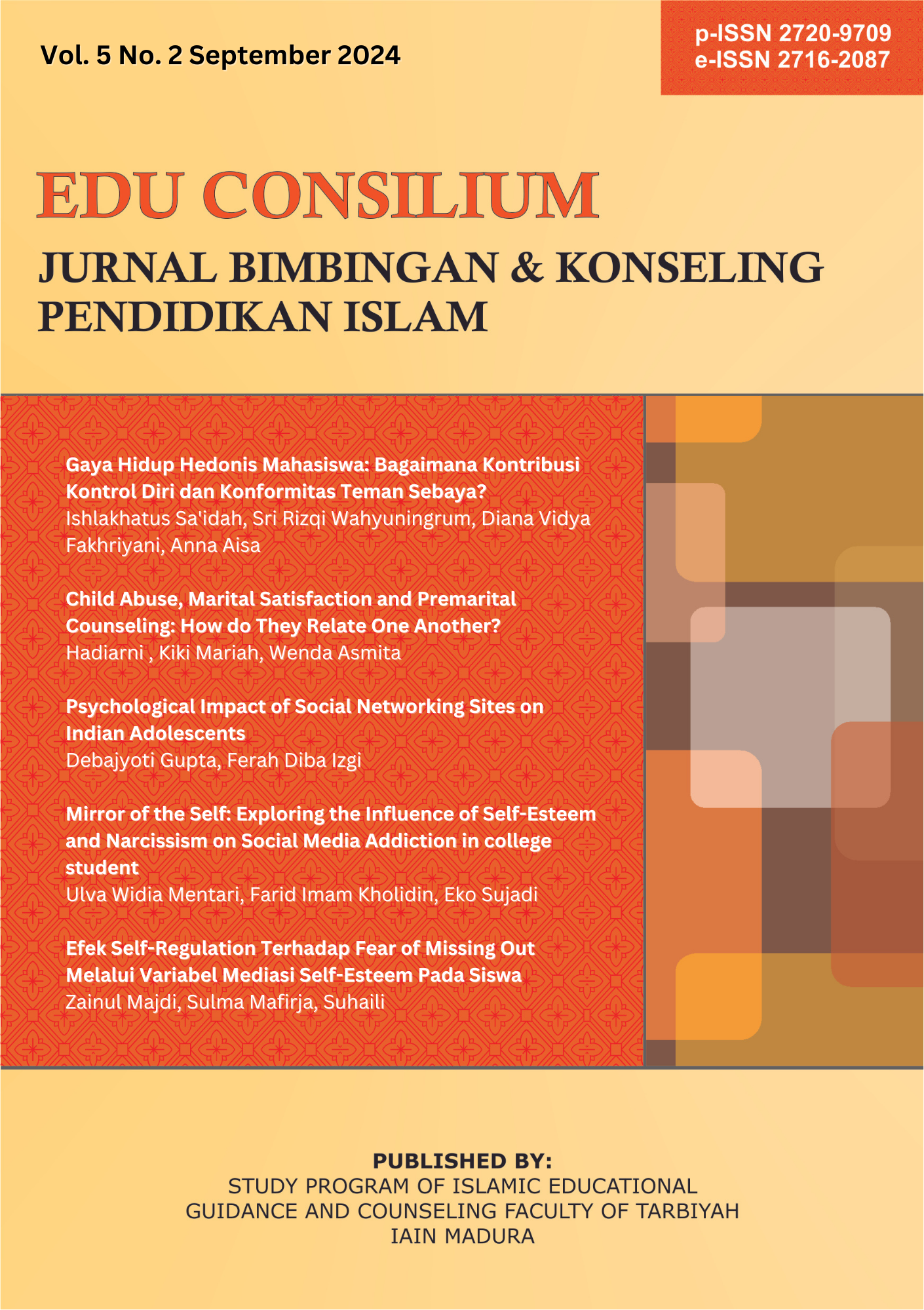Gaya Hidup Hedonis Mahasiswa: Bagaimana Kontribusi Kontrol Diri dan Konformitas Teman Sebaya?
 Abstract views: 522
,
Abstract views: 522
,
 PDF downloads: 633
PDF downloads: 633
Abstract
A hedonic lifestyle is one where every activity is related to pleasure or life satisfaction. One of the factors that influences a hedonic lifestyle is self-control and peer conformity. This research aims to determine the influence of self-control and peer conformity on hedonic lifestyles and to find out how much influence self-control and peer conformity have on hedonic lifestyles in students. The research method used is quantitative research. The location of this research is the Tarbiyah Institute of the Madura State Islamic Religion Faculty. Sampling in this study used a purposive random sampling technique. The respondents in this research were 137 students. Data collection techniques included the Self-Control Scale, the Peer Conformity Scale, and the Hedonic Lifestyle Scale. The data analysis technique used is multiple linear regression analysis using SPSS software. The results of this study show: first, self-control and peer conformity influence students' hedonic lifestyles (Ha accepted). The basis for making this decision is the significance value of self-control (0.000 < 0.05) and the significance value of peer conformity (0.001 < 0.05); secondly, the variables self-control (X1) and peer conformity (X2) simultaneously influence the hedonic lifestyle variable (Y) by 42.7%. Meanwhile, it is possible that it is influenced by other variables outside the variables that were not examined in this research.
Downloads
References
Azizah, F. N., & Indrawati, E. S. (n.d.). Kontrol diri dan gaya hidup hedonis pada mahasiswa Fakultas Ekonomika dan Bisnis Universitas Diponegoro. Jurnal Empati, 4(4), 156–162.
Fatmawati, N. (2020). Gaya hidup mahasiswa akibat adanya online shop. Jurnal Pendidikan Ilmu Sosial, 1(29), 29–38.
Jamaludin, A. N. (2015). Sosiologi perkotaan: memahami masyarakat kota dan problematikanya.
Khairunnisa, Y. P. (2023). Kebiasaan Gaya Hidup Hedonisme Terhadap Perkembangan Kepribadian Anak. Jurnal Bimbingan Konseling Dan Psikologi, 3(1), 31–44.
Ligit, M. (2016). Kontrol diri dan penyesuaian diri dalam pernikahan remaja putri yang menjalani pernikahan dini akibat kehamilan pra nikah. Psikoborneo: Jurnal Ilmiah Psikologi, 4(3).
Rista, Y., & Jalil, A. (2021). Gaya hidup hedonisme mahasiswa di Kota Pekanbaru. Jurnal Online Mahasiswa (JOM) Bidang Ilmu Sosial Dan Ilmu Politik, 8(1), 1–11.
Suminar, E., & Meiyuntari, T. (2015). Konsep diri, konformitas dan perilaku konsumtif pada remaja. Persona: Jurnal Psikologi Indonesia, 4(2).
Swagler, M.A. & Jome, L. M. (2005). The effects of personality and acculturation on the adjustment of north american sojourners in Taiwan. Journal of Counselling Psychology, 52(4), 527–536.
Veenhoven, R. (2003). Hedonism and happiness. Journal of Happiness Studies, 4, 437–457.
The journal operates an Open Access policy under a Creative Commons Non-Commercial 4.0 International license. Authors who publish with this journal agree to the following terms:
- Authors retain copyright and grant the journal right of first publication with the work simultaneously licensed under a
 Commons Attribution-NonCommercial 4.0 International License
Commons Attribution-NonCommercial 4.0 International Licensethat allows others to share — copy and redistribute the material in any medium or format, and adapt — remix, transform, and build upon the material.
- Authors are able to enter into separate, additional contractual arrangements for the non-exclusive distribution of the journal's published version of the work (e.g., post it to an institutional repository or publish it in a book), with an acknowledgement of its initial publication in this journal.
- Authors are permitted and encouraged to post their work online (e.g., in institutional repositories or on their website) prior to and during the submission process, as it can lead to productive exchanges, as well as earlier and greater citation of published work (see The Effect of Open Access).




















